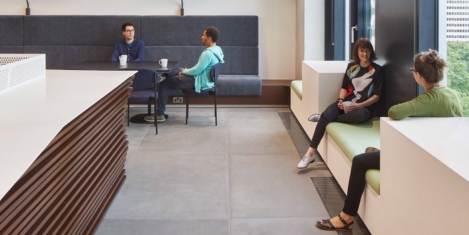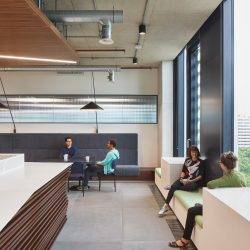March 2, 2018
Productivity, retention and employee wellbeing improve when there is workplace trust

Being in a reliable work environment increases retention, productivity and employee wellbeing, while also promoting a better business culture, finds new research from Bupa. An examination of workplace trust and the impact on employee wellbeing reveals that over half (53 per cent) of employees considered it to be a major factor in whether they stayed or left a company. The research found that nearly a quarter of UK employees (24 per cent) have left their company due to issues around trust. Although trust is not a tangible workplace benefits, such as salary and bonuses, it is an essential variable in promoting harmony and productivity within an organisation and the study suggests how important it is within the workplace, and also the contribution it makes to the wellbeing of employees and the overall performance of a company. The study also asked employees how trust compares to other company benefits. Nearly two thirds (62 per cent) believe that trust is more important than a gym membership or company mobile, while over half value it more than a free canteen (56 per cent) and company car (55 per cent).


















 Corporate real estate departments need to become more effective partners in the agile transformation of their broader organizations., claims a new survey conducted by CBRE, in partnership with CoreNet Global. When describing Portfolio Agility, i.e. the ability to rapidly adapt, scale and reposition the organization’s real estate portfolio to support shifting enterprise needs, 67 percent consider portfolio agility as the most important type of agility for business success, yet only 14 percent consider themselves highly agile in this area. The most prevalent portfolio agility practices included negotiating flexible space options in the lease, seeking shorter and/or more flexible lease terms, supporting an enterprise-wide flex-work program and delivering free address work environments. The report states that new workplace guidelines for efficiency have altered the way companies plan for density and more occupiers are incorporating third-party ‘agile space’ into their overall real estate strategy.
Corporate real estate departments need to become more effective partners in the agile transformation of their broader organizations., claims a new survey conducted by CBRE, in partnership with CoreNet Global. When describing Portfolio Agility, i.e. the ability to rapidly adapt, scale and reposition the organization’s real estate portfolio to support shifting enterprise needs, 67 percent consider portfolio agility as the most important type of agility for business success, yet only 14 percent consider themselves highly agile in this area. The most prevalent portfolio agility practices included negotiating flexible space options in the lease, seeking shorter and/or more flexible lease terms, supporting an enterprise-wide flex-work program and delivering free address work environments. The report states that new workplace guidelines for efficiency have altered the way companies plan for density and more occupiers are incorporating third-party ‘agile space’ into their overall real estate strategy.


 In a workplace dominated by insecurity, gig work and intelligent machines we need to improve our understanding of their potential impact on health, safety and wellbeing claims a new report.
In a workplace dominated by insecurity, gig work and intelligent machines we need to improve our understanding of their potential impact on health, safety and wellbeing claims a new report. 

 The majority of employers want students to have work experience to help acquire leadership skills, yet not even a third say they actually offer placements. This is according to new research published today by the Chartered Management Institute (CMI) which is calling on employers to collaborate with business schools and universities in creating courses to provide future leaders. The Chartered Management Institute’s 21st Century Leaders report found that seven in 10 (70 percent) of prospective employers now want management, enterprise and leadership modules made available to all higher education students to improve their work-ready skills. Two-thirds (66 percent) of employers say they want to see graduates achieve professional qualifications as well as their main degree. The growing emphasis on graduate employability has been driven by employers concerned about skills shortages, with 82 percent of employers reporting problems recruiting managers. A majority of managers (85 percent) said work experience should be embedded into courses to help develop these skills and make students more employable. Yet only 29 percent of businesses work with business schools to offer placements.
The majority of employers want students to have work experience to help acquire leadership skills, yet not even a third say they actually offer placements. This is according to new research published today by the Chartered Management Institute (CMI) which is calling on employers to collaborate with business schools and universities in creating courses to provide future leaders. The Chartered Management Institute’s 21st Century Leaders report found that seven in 10 (70 percent) of prospective employers now want management, enterprise and leadership modules made available to all higher education students to improve their work-ready skills. Two-thirds (66 percent) of employers say they want to see graduates achieve professional qualifications as well as their main degree. The growing emphasis on graduate employability has been driven by employers concerned about skills shortages, with 82 percent of employers reporting problems recruiting managers. A majority of managers (85 percent) said work experience should be embedded into courses to help develop these skills and make students more employable. Yet only 29 percent of businesses work with business schools to offer placements.








February 28, 2018
The very idea of good work in a gig economy remains a distant ideal
by Tonia Novitz, Alan Bogg et al • Comment, Flexible working
(more…)